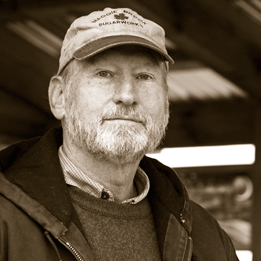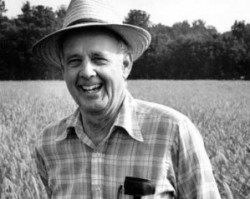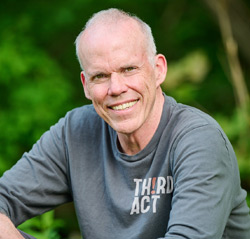Professor Emeritus John Elder

John Elder, a professor at Middlebury from 1973 to 2010, is a renowned scholar of American nature writing and pastoral literature, contemporary poetry, and environmental studies. Elder’s most recent books reflect both memoir as well the natural history of Vermont and include titles such as Reading the Mountains of Home, The Frog Run, and Pilgrimage to Vallombrosa.
Elder’s voice is particularly relevant to the FoodWorks interns as he has been a leader in experimental learning exploring space, place, and the human relationship to the natural environment, as well as being a proponent of exploring agriculture in the liberal arts curriculum. A recent course instructed by Elder titled “Fast Food/Slow Food” considered writing and films about food, exploring the rise of industrial food and fast-food franchises as well as the local food movement and the international Slow Food network.
A former student writes of the beloved professor:
“Perhaps the greatest lesson Elder has taught me is that the truest forms of wisdom, the kind of wisdom that radiates from him, is wisdom that asks questions, and challenges us to see further, beyond ourselves… John has taught us that the best classroom discussions are the ones where nobody has the answers, and instead, students and professors alike are inspired to build off each other’s ideas in an effort to see deeper into the questions of our hearts, minds and souls.”
For more information, check out a profile of Elder by the Seven Days, as well as his 2010 Margolin Environmental Affairs Lecture at Middlebury College.
Wendell Berry
 Wendell Berry is a conservationist, farmer, essayist, novelist, professor of English, and poet. He was born August 5, 1934 in Henry Country, Kentucky where he now lives on a farm. The New York Times has called Berry the “prophet of rural America.” Wendell Berry is the author of more than 30 books of essays, poetry and novels. He has worked a farm in Henry County, Kentucky since 1965. He is a former professor of English at the University of Kentucky and a past fellow of both the Guggenheim Foundation and the Rockefeller Foundation. He has received numerous awards for his work, including an award from the National Institute and Academy of Arts and letters in 1971, and most recently, the T. S. Eliot Award.
Wendell Berry is a conservationist, farmer, essayist, novelist, professor of English, and poet. He was born August 5, 1934 in Henry Country, Kentucky where he now lives on a farm. The New York Times has called Berry the “prophet of rural America.” Wendell Berry is the author of more than 30 books of essays, poetry and novels. He has worked a farm in Henry County, Kentucky since 1965. He is a former professor of English at the University of Kentucky and a past fellow of both the Guggenheim Foundation and the Rockefeller Foundation. He has received numerous awards for his work, including an award from the National Institute and Academy of Arts and letters in 1971, and most recently, the T. S. Eliot Award.
Claude Stephens
Brian Barnes
David Wicks (from his blog)
Ivor Chodkowski
Ivor Chodkowski is one of the most respected frontrunners of the local food movement, beginning 17 years ago with his first tenant operation. An urban farm practicing Community Supported Agriculture (CSA), Field Day Family Farm produces vegetables, hogs, chickens, and sometimes turkeys on 8 acres of land, has a CSA of 65 families, does farmers markets, and regularly employs more than half a dozen people on the farm.ation, Field Day Family Farm, Over the years, his
efforts have spread to creating in educational havens, a local food distribution company, a restaurant, and advocating for community change.
John-Mark Hack (Marksbury Farm website)
John-Mark Hack, a Woodford County resident, has worked in Kentucky agriculture for over 20 years, and established the Governor’s Office of Agricultural Policy in 1998 during the administration of Governor Paul Patton. He also served as the first President of the Kentucky Tobacco Settlement Trust Corporation and the first CEO of the Kentucky Agricultural Development Fund.
Karyn Moskowitz (New Roots website)
Karyn’s passion for food justice led her to found New Roots, as well as introducing the Fresh Stop model to Louisville. She is committed to working with farmers, community organizing and facilitating leadership development with other food justice leaders in Louisville neighborhoods with limited access to food, and getting people, especially children, to eat fresh food. She also works in the areas of public interest and environmental law for citizens’ groups nationally. She is the proud mother of middle schooler Cicada Hoyt, who eats all her vegetables. Karyn, herself, particularly loves Kentucky-grown spinach. She has an MBA in Environmental Management.
Valerie Magnuson
Valerie Magnuson was born in Louisville and there she has remained for the majority of her life. She hopes that by deepening her connection to the urban environment where she was raised she can begin to understand the ecology of the city and help our communities adapt to a changing climate. She studies urban sustainability and social change at UofL and currently serves as the Executive Director of Louisville Grows, a local non-profit committed to building community through urban agriculture and sustainable solutions.
 Bill McKibben is the author of a dozen books about the environment, beginning with The End of Nature in 1989, which is regarded as the first book for a general audience on climate change. He is a founder of the grassroots climate campaign 350.org, which has coordinated 15,000 rallies in 189 countries since 2009. Time Magazine called him ‘the planet’s best green journalist’ and the Boston Globe said in 2010 that he was ‘probably the country’s most important environmentalist.’ Schumann Distinguished Scholar at Middlebury College, he holds honorary degrees from a dozen colleges, including the Universities of Massachusetts and Maine, the State University of New York, and Whittier and Colgate Colleges. In 2011 he was elected a fellow of the American Academy of Arts and Sciences.Bill grew up in suburban Lexington, Massachusetts. He was president of the Harvard Crimson newspaper in college. Immediately after college he joined the New Yorkermagazine as a staff writer, and wrote much of the “Talk of the Town” column from 1982 to early 1987. He quit the magazine when its longtime editor William Shawn was forced out of his job, and soon moved to the Adirondack Mountains of upstate New York.His first book, The End of Nature, was published in 1989 by Random House after being serialized in the New Yorker. It is regarded as the first book for a general audience about climate change, and has been printed in more than 20 languages. Several editions have come out in the United States, including an updated version published in 2006.His next book, The Age of Missing Information, was published in 1992. It is an account of an experiment: McKibben collected everything that came across the 100 channels of cable tv on the Fairfax, Virginia system (at the time among the nation’s largest) for a single day. He spent a year watching the 2,400 hours of videotape, and then compared it to a day spent on the mountaintop near his home. This book has been widely used in colleges and high schools, and was reissued in a new edition in 2006.Subsequent books include Hope, Human and Wild, about Curitiba, Brazil and Kerala, India, which he cites as examples of people living more lightly on the earth; The Comforting Whirlwind: God, Job, and the Scale of Creation, which is about the Book of Job and the environment; Maybe One, about human population; Long Distance: A Year of Living Strenuously, about a year spent training for endurance events at an elite level; Enough, about what he sees as the existential dangers of genetic engineering; Wandering Home, about a long solo hiking trip from his current home in the mountains east of Lake Champlain in Ripton, Vermont back to his longtime neighborhood of the Adirondacks.In March 2007 McKibben published Deep Economy: the Wealth of Communities and the Durable Future. It addresses what the author sees as shortcomings of the growth economy and envisions a transition to more local-scale enterprise.In late summer 2006, Bill helped lead a five-day walk across Vermont to demand action on global warming that some newspaper accounts called the largest demonstration to date in America about climate change. Beginning in January 2007 he foundedstepitup07.org to demand that Congress enact curbs on carbon emissions that would cut global warming pollution 80 percent by 2050. With six college students, he organized 1,400 global warming demonstrations across all 50 states of America on April 14, 2007. Step It Up 2007 has been described as the largest day of protest about climate change in the nation’s history. A guide to help people initiate environmental activism in their community coming out of the Step It Up 2007 experience entitled Fight Global Warming Now was published in October 2007 and a second day of action on climate change was held the following November 3.March 2008 saw the publication of The Bill McKibben Reader, a collection of 44 essays written for various publications over the past 25 years.Bill is a frequent contributor to various magazines including The New York Times, The Atlantic Monthly, Harper’s, Orion Magazine, Mother Jones, The New York Review of Books, Granta, Rolling Stone, and Outside. He is also a board member and contributor to Grist Magazine.Bill has been awarded Guggenheim and Lyndhurst Fellowships, and won the Lannan Prize for nonfiction writing in 2000. He has honorary degrees from Green Mountain College, Unity College, Lebanon Valley College and Sterling College.Bill currently resides with his wife, writer Sue Halpern, and his daughter, Sophie, who was born in 1993, in Ripton, Vermont. He is a scholar in residence at Middlebury College.
Bill McKibben is the author of a dozen books about the environment, beginning with The End of Nature in 1989, which is regarded as the first book for a general audience on climate change. He is a founder of the grassroots climate campaign 350.org, which has coordinated 15,000 rallies in 189 countries since 2009. Time Magazine called him ‘the planet’s best green journalist’ and the Boston Globe said in 2010 that he was ‘probably the country’s most important environmentalist.’ Schumann Distinguished Scholar at Middlebury College, he holds honorary degrees from a dozen colleges, including the Universities of Massachusetts and Maine, the State University of New York, and Whittier and Colgate Colleges. In 2011 he was elected a fellow of the American Academy of Arts and Sciences.Bill grew up in suburban Lexington, Massachusetts. He was president of the Harvard Crimson newspaper in college. Immediately after college he joined the New Yorkermagazine as a staff writer, and wrote much of the “Talk of the Town” column from 1982 to early 1987. He quit the magazine when its longtime editor William Shawn was forced out of his job, and soon moved to the Adirondack Mountains of upstate New York.His first book, The End of Nature, was published in 1989 by Random House after being serialized in the New Yorker. It is regarded as the first book for a general audience about climate change, and has been printed in more than 20 languages. Several editions have come out in the United States, including an updated version published in 2006.His next book, The Age of Missing Information, was published in 1992. It is an account of an experiment: McKibben collected everything that came across the 100 channels of cable tv on the Fairfax, Virginia system (at the time among the nation’s largest) for a single day. He spent a year watching the 2,400 hours of videotape, and then compared it to a day spent on the mountaintop near his home. This book has been widely used in colleges and high schools, and was reissued in a new edition in 2006.Subsequent books include Hope, Human and Wild, about Curitiba, Brazil and Kerala, India, which he cites as examples of people living more lightly on the earth; The Comforting Whirlwind: God, Job, and the Scale of Creation, which is about the Book of Job and the environment; Maybe One, about human population; Long Distance: A Year of Living Strenuously, about a year spent training for endurance events at an elite level; Enough, about what he sees as the existential dangers of genetic engineering; Wandering Home, about a long solo hiking trip from his current home in the mountains east of Lake Champlain in Ripton, Vermont back to his longtime neighborhood of the Adirondacks.In March 2007 McKibben published Deep Economy: the Wealth of Communities and the Durable Future. It addresses what the author sees as shortcomings of the growth economy and envisions a transition to more local-scale enterprise.In late summer 2006, Bill helped lead a five-day walk across Vermont to demand action on global warming that some newspaper accounts called the largest demonstration to date in America about climate change. Beginning in January 2007 he foundedstepitup07.org to demand that Congress enact curbs on carbon emissions that would cut global warming pollution 80 percent by 2050. With six college students, he organized 1,400 global warming demonstrations across all 50 states of America on April 14, 2007. Step It Up 2007 has been described as the largest day of protest about climate change in the nation’s history. A guide to help people initiate environmental activism in their community coming out of the Step It Up 2007 experience entitled Fight Global Warming Now was published in October 2007 and a second day of action on climate change was held the following November 3.March 2008 saw the publication of The Bill McKibben Reader, a collection of 44 essays written for various publications over the past 25 years.Bill is a frequent contributor to various magazines including The New York Times, The Atlantic Monthly, Harper’s, Orion Magazine, Mother Jones, The New York Review of Books, Granta, Rolling Stone, and Outside. He is also a board member and contributor to Grist Magazine.Bill has been awarded Guggenheim and Lyndhurst Fellowships, and won the Lannan Prize for nonfiction writing in 2000. He has honorary degrees from Green Mountain College, Unity College, Lebanon Valley College and Sterling College.Bill currently resides with his wife, writer Sue Halpern, and his daughter, Sophie, who was born in 1993, in Ripton, Vermont. He is a scholar in residence at Middlebury College.